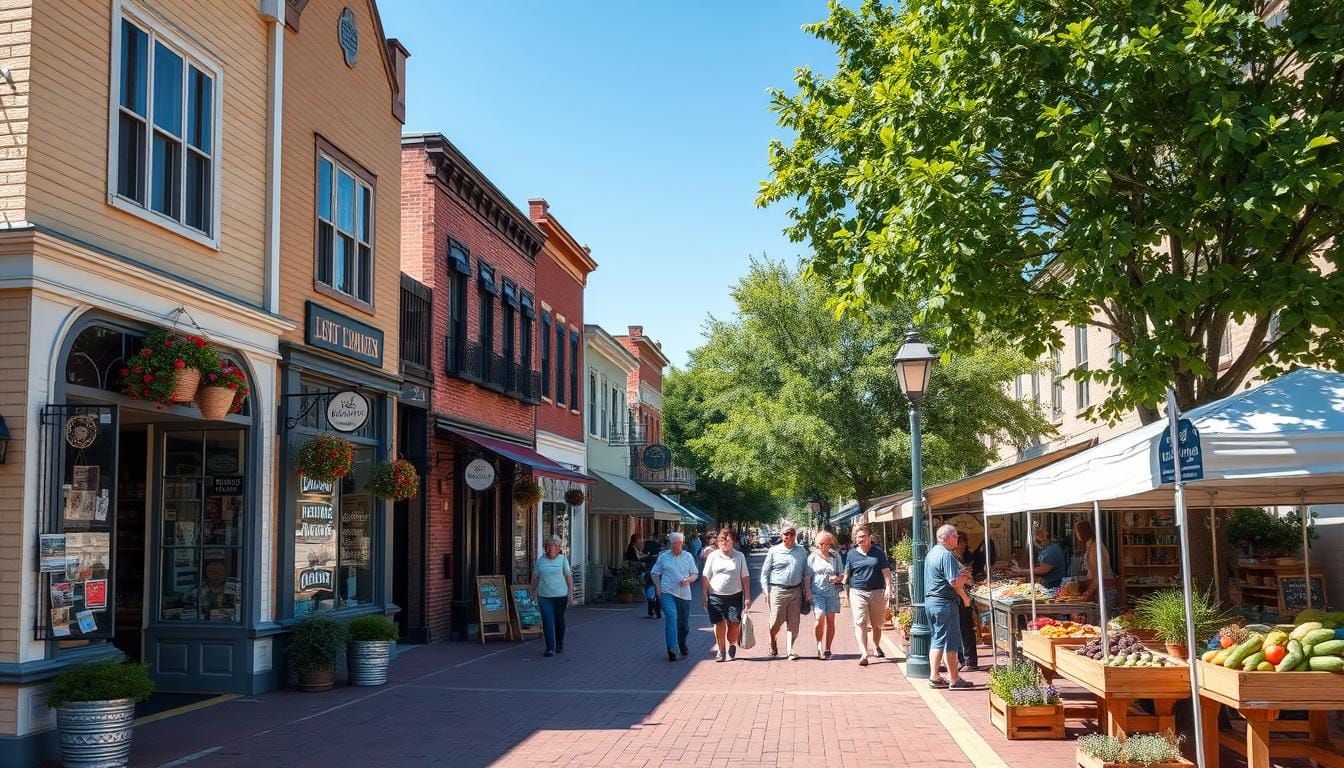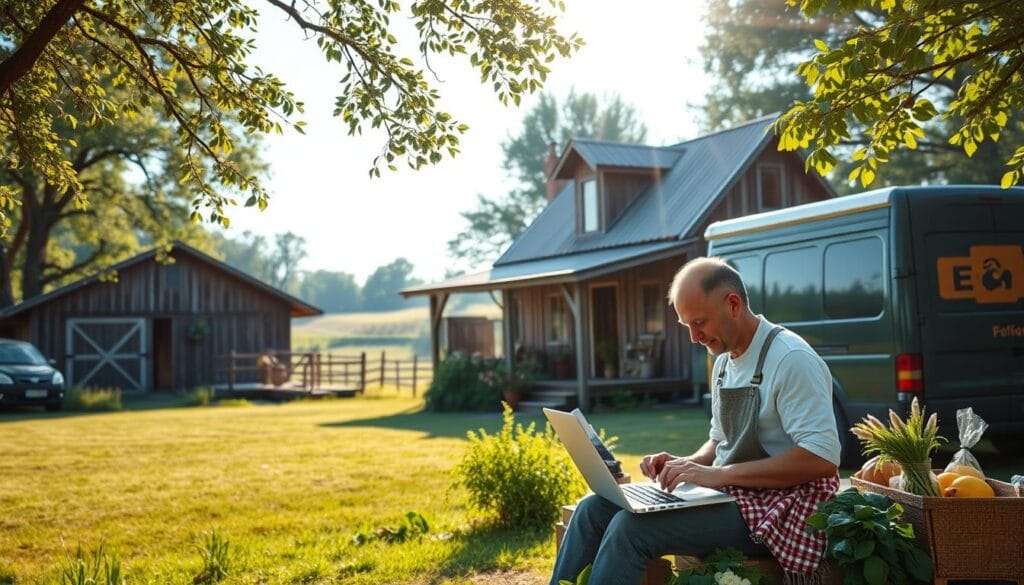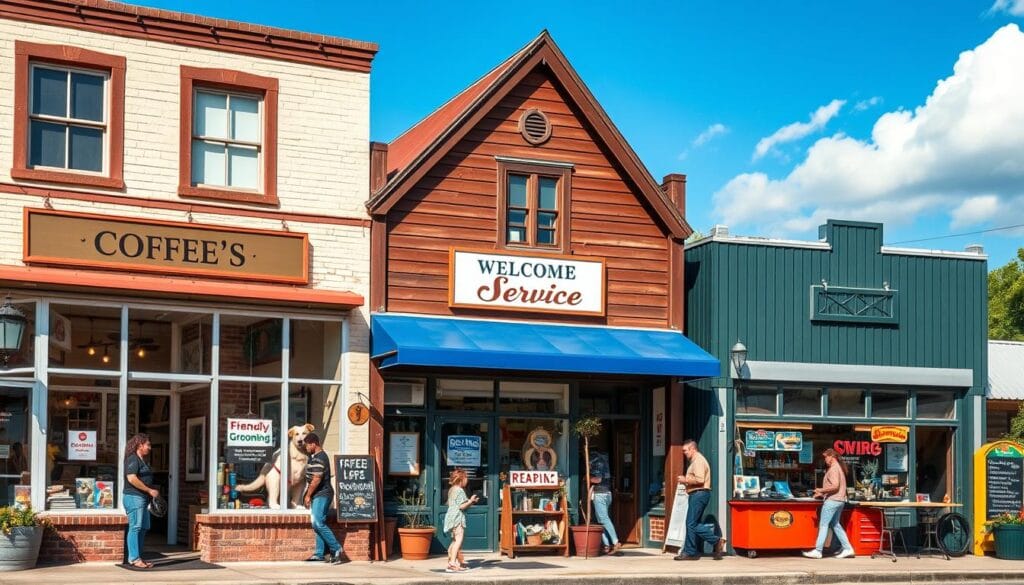Profitable Business Ideas for Small Towns in 2025

Ninety-one percent of people like to shop at local small businesses when they can. This shows a big chance for entrepreneurs in small towns across America. With 84% of small business owners feeling good about their future, it’s a great time for new businesses to grow in rural areas.
The way people shop is changing, with more sales happening online. Small town businesses need to keep up with these changes to stay ahead. They must find ways to meet the new needs and trends of their customers.
Table of Contents
Key Takeaways
- Consumers increasingly favor supporting local businesses in small towns when convenient
- Owners of small businesses are positive about the future growth potential of their companies
- Retail sales are projected to rise, with non-store and online channels seeing significant growth
- Small towns offer unique opportunities for entrepreneurs to establish successful ventures
- Diversifying revenue streams and adapting to evolving consumer preferences are crucial for small town businesses
Understanding the Small Town Business Landscape
Small towns in America are becoming key players in the economy. They offer great chances for new businesses to grow. It’s important to know the trends, economic factors, and demographics that shape these towns.
Current Market Statistics and Trends
Small towns have fewer than 50,000 people, creating a tight-knit community. This environment helps local businesses succeed. They rely on personal connections and word-of-mouth to grow.
Starting a business here is cheaper because of lower costs and less competition. This makes it easier for new businesses to start and succeed.
Economic Factors Driving Small Town Growth
The economy in small towns is getting better for local businesses. Starting a business here is easier because of affordable real estate and less competition. This gives new businesses a chance to grow and meet local needs.
Demographics and Consumer Behavior
The people and their spending habits in small towns matter a lot for businesses. Residents often stick together, helping local businesses thrive. Knowing what the community wants is key for success.
“The secret to success in small-town business is to focus on the local community and build strong relationships with your customers. By understanding their needs and catering to them, you can create a loyal following that will sustain your enterprise.”
As small-town businesses grow, they can take advantage of what these towns offer. By keeping up with trends and understanding the community, startups can thrive. They become important parts of their towns’ growth and vitality.
Top Business Ideas for Small Towns
Entrepreneurs are making small towns vibrant again with main street revivals, niche market ventures, and hometown innovations. The rise of e-commerce and demand for local services open up new business opportunities. Small towns are full of potential for growth.
E-commerce is booming, with online sales growing 7-9% each year. This is a great chance for small town businesses to expand their reach online. The food industry is also on the rise, with food trucks and ghost kitchens offering affordable entry points for food entrepreneurs.
The education and tutoring sector is another promising area. Private tutors can earn nearly $72,000 a year, meeting the need for personalized learning. B2B services like accounting, web design, and digital marketing are also in demand, supporting the growth of startups.
As people look for unique experiences and quality products, entrepreneurs can meet these needs. From specialty food shops to clothing boutiques and tech-focused co-working spaces, the possibilities are endless. Small towns are the perfect place for main street revivals, niche market ventures, and hometown innovations.
E-commerce Opportunities in Rural Areas
The rise of rural entrepreneurship has opened up a world of e-commerce possibilities for small businesses in small towns and villages. With the rapid growth of online retail, rural entrepreneurs are tapping into the vast global market. They reach a larger audience by showcasing their distinctive goods and services.
Online Retail Strategies
Dropshipping businesses offer a low-risk entry into e-commerce, with estimated startup costs between $300 and $1,000. Skills required include e-commerce knowledge, product research, and digital marketing. Successful examples like Gymshark show the potential for growth from a small dropshipping business to a multimillion-dollar brand through strategic branding and social media marketing.
Digital Marketplaces for Local Products
Rural Creamery, a cheese producer in Wisconsin, saw a 150% increase in sales within a year of launching its online store. This shows the revenue potential of e-commerce for rural businesses. Crafted in the Cornfields, a group of artisans in Iowa, doubled their sales in just six months after launching their online store. This demonstrates the potential for quick expansion in rural e-commerce.
Shipping and Logistics Solutions
Efficient logistics and partnerships with local postal and courier services are essential for timely deliveries and customer satisfaction in rural e-commerce ventures. Reliable internet access is crucial for rural e-commerce success. Programs like the Federal Communications Commission’s (FCC) Rural Digital Opportunity Fund play a role in improving connectivity.
| Key Statistic | Implication |
|---|---|
| In 2020, about 25% of rural small businesses reported selling online, indicating a significant rise in e-commerce adoption among rural entrepreneurs. | The growing embrace of e-commerce by rural entrepreneurs highlights the untapped potential for online sales and a shift in consumer behavior. |
| E-commerce sales globally reached $4.28 trillion in 2020, showcasing the substantial market size that small businesses in rural areas can tap into. | Rural entrepreneurs have the opportunity to reach a global customer base and participate in the thriving e-commerce industry. |
| A small farm selling organic produce online might hire additional staff for packing and shipping orders, contributing to job creation in rural communities. | E-commerce can spur economic growth and employment in rural areas by enabling small businesses to scale and expand their operations. |

“The rise of rural entrepreneurship has opened up a world of e-commerce possibilities for small businesses in small towns and villages.”
Local Service-Based Business Ventures
If you’re thinking about starting a small business in a rural or small town, consider local service-based businesses. These businesses meet community needs and offer great opportunities for entrepreneurs. They help build a sustainable small business opportunities in small-town America.
Personal fitness training is a great idea for small towns. It costs between $500 and $3,000 to start. Success comes from having a loyal client base and creating fitness plans that fit your community’s needs.
Event planning is another good choice. It costs between $1,500 and $3,000 to begin. By knowing what your community likes, you can plan events that everyone will remember.
Mobile car wash services are also a good option. They cost between $2,000 and $5,000 to start. This service is convenient for busy people, helping you build a loyal customer base.
| Service-Based Business Idea | Startup Costs | Potential Revenue |
|---|---|---|
| Personal Fitness Training | $500 – $3,000 | Salaries for virtual fitness trainers range from $30,000 to $70,000 per year. |
| Event Planning | $1,500 – $3,000 | Successful event planning businesses can generate over $100,000 in annual revenue. |
| Mobile Car Wash | $2,000 – $5,000 | The total market valuation for cleaning services is projected to reach $276 billion by 2028. |
By choosing these local service-based businesses, you can make a difference in your community. Focus on personalized services and understanding your local market. This way, you can grow a successful business that benefits your community.

Food and Beverage Industry Opportunities
In small towns, the food and beverage sector is booming. Entrepreneurs can find many profitable ideas here. From food trucks to ghost kitchens, there’s a lot to explore.
Food Truck Business Models
Food trucks are growing faster than traditional restaurants. They’re great for small towns because they’re cheap to start and can move around. They make good money, especially at local events.
Ghost Kitchen Concepts
Ghost kitchens focus on take-out and delivery. They’re perfect for small towns because they’re cheaper to run. They can also earn a lot of money.
Local Catering Services
Local catering services are in demand. They offer unique, locally-sourced food. They know the community well and can create special menus.
Small-town entrepreneurs can make the most of the food industry. They can use new ideas and know their community well. This way, they can succeed in the food world.
Beauty and Personal Care Services
The global beauty industry is booming, expected to hit $716 billion by 2025. Small towns in the U.S. are ready to grab the chance for personalized beauty and care services. From reflexology to barbershops, there’s a lot of room for local entrepreneurs to grow and make money.
For example, reflexology can make $30,000 to $80,000 a year. It starts with just $2,000 to $10,000 and takes 2-4 months to set up. Barbershops can make $50,000 to $100,000 yearly. They need $20,000 to $100,000 to start and take 6 months to a year to launch.
Other great ideas include tanning salons, body waxing, nail polish salons, brow bars, and body piercing shops. These can make $50,000 to $150,000 a year. They start with $5,000 to $50,000 and take 1-6 months to open.
If you love beauty and want to start a business, there are endless chances. With creativity, research, and effort, you can change your community and earn well in this booming field.
| Business Idea | Potential Annual Revenue | Startup Cost | Establishment Period |
|---|---|---|---|
| Reflexology Services | $30,000 – $80,000 | $2,000 – $10,000 | 2-4 months |
| Barbershop | $50,000 – $100,000 | $20,000 – $100,000 | 6 months – 1 year |
| Tanning Salon | $50,000 – $150,000 | $50,000 – $100,000 | 6 months – 1 year |
| Body Waxing Salon | $50,000 – $100,000 | $10,000 – $50,000 | 3-6 months |
| Nail Polish Salon | $50,000 – $150,000 | $10,000 – $50,000 | 3-6 months |
| Brow Bar | $50,000 – $150,000 | $5,000 – $20,000 | 1-3 months |
| Body Piercing Shop | $50,000 – $150,000 | $10,000 – $50,000 | 3-6 months |
Small-town entrepreneurs can also dive into hair and skincare, lash studios, perfume shops, jewelry-making, and more. With the right strategy and understanding of their community, they can make the most of the beauty and personal care industry’s growth.
Educational and Tutoring Services
In today’s digital world, educational and tutoring services are a great chance for rural entrepreneurship and village economic development. Online learning platforms have made it easier for small-town entrepreneurs to share their knowledge. They can offer educational solutions to learners everywhere.
Online Learning Platforms
Online tutoring services are more popular than ever, thanks to remote education. Entrepreneurs can create easy-to-use online platforms. This lets them teach a variety of subjects to many students.
They can offer flexible schedules and affordable prices. This model helps students in remote areas get the education they need.
Specialized Training Programs
Small-town entrepreneurs can also offer specialized training. This could be in vocational skills, professional development, or workshops on topics like agriculture or entrepreneurship. These programs can help grow the local economy by teaching in-demand skills.
Test Preparation Services
Standardized tests like the SAT or ACT can be tough for rural students. Entrepreneurs can help by offering test prep services. They can do this in person or online.
By helping students succeed, these services can positively impact the community. They can help students reach their goals and improve their future.
Rural entrepreneurship in education is a great chance to make a difference. By using technology and understanding local needs, entrepreneurs can help grow the economy. They can also empower the next generation of learners.
Home Improvement and Maintenance Businesses
The home improvement sector is booming for small business owners in small towns. With more people wanting to update their kitchens and bathrooms, the remodeling industry is growing. This means there are chances for businesses selling home products and for contractors to make a profit.
There’s also a big need for organizational products and services because of remote work. Small businesses can offer home automation, handyman services, floor installation, and interior decorating. These businesses can help the local economy and provide important services to the community.
For those looking to start a business, the home improvement and maintenance industry has many options. Services like painting, weatherization, garage door repair, and septic tank cleaning are always needed. These services offer a stable income and the chance to grow in small towns. By meeting the needs of homeowners, these businesses can become key parts of the local economy.
FAQ
What is the current state of small businesses in the U.S.?
Small businesses are a big part of the U.S. economy. They make up 99.9% of all firms. There are 33.3 million small to medium-sized businesses across the country.
Every month, 430,000 new U.S. business applications are filed. This is 50% more than in 2019.
What are the growth forecasts for the retail industry?
The National Retail Federation predicts retail sales will grow. They expect sales to increase between 2.5% and 3.5% in 2024. This will reach $5.23 trillion to $5.28 trillion.
Non-store and online sales are expected to grow even more. They will increase between 7% and 9% year over year. This will range from $1.47 trillion to $1.50 trillion.
What are the trends in the baby product and beauty industries?
The baby product industry is growing fast. It is expected to reach $12.8 billion in revenue in 2024. Safety products, furniture, and entertainment items are popular.
The beauty industry is becoming more inclusive. The personal care market for men is projected to hit $276.9 billion by 2030. The global clean beauty market is expected to grow from $5.4 billion in 2020 to $11.6 billion in 2027.
What is the outlook for the home improvement sector?
The home improvement sector is thriving. The remodeling industry maintains an average profit margin of 6.3% through 2027. There are opportunities for businesses selling home products and for contractors and remodelers.
What are the e-commerce opportunities for small towns?
E-commerce opportunities are expanding. Online and non-store sales are expected to grow 7-9% year over year. Dropshipping businesses offer a low-risk entry into e-commerce, with estimated startup costs between $300 and $1,000.
What are some service-based business ideas for small towns?
Service-based business ideas include personal fitness training, event planning, and mobile car wash services. Startup costs range from $500 to $5,000, depending on the business.
What are the opportunities in the food and beverage industry for small towns?
Food trucks and ghost kitchens offer lower startup costs. They are great for aspiring food business owners. Ghost kitchens focus on take-out and delivery. Home-based bakeries are also an option, with estimated startup costs between $2,000 and $5,000.
What are the trends in the beauty and personal care industry?
The personal care market for men is projected to hit $276.9 billion by 2030. The global clean beauty market is expected to grow from $5.4 billion in 2020 to $11.6 billion in 2027. Pet grooming services are also in high demand, with startup costs ranging from $2,000 to $5,000.
What are the opportunities in the educational and tutoring services sector?
Online tutoring services are growing. They are experiencing growth due to the rise of online education. Startup costs range from $500 to $2,000. Tutors are in high demand, with private tutors averaging sales of nearly $72,000 a year.



